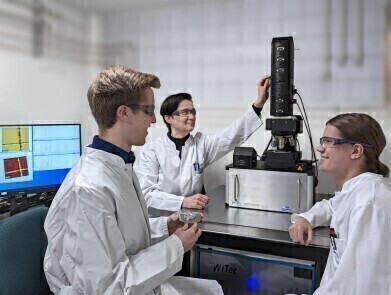-
 Florian Klein (left) and Leon Gläser (right) from the ZSW in Ulm together with WITec Application Scientist Dr. Ievgeniia Iermak (middle) during training on the new Raman microscope.
Florian Klein (left) and Leon Gläser (right) from the ZSW in Ulm together with WITec Application Scientist Dr. Ievgeniia Iermak (middle) during training on the new Raman microscope.
News & Views
Raman Technology to assess Electrode Performance
Mar 28 2023
The Center for Solar Energy and Hydrogen Research (ZSW) Baden-Württemberg has installed a Raman microscope for use in its new pilot plant in Ulm, where cathode materials for lithium-ion batteries will be produced and the scalability of fabrication methods will be investigated.
The performance of Lithium-ion batteries, a primary enabling technology in the current shift toward electric mobility, is almost exclusively determined by the materials used. Over the next 12 months ZSW is constructing the Powder-Up pilot plant that will focus on making improvements in the next generation of battery electrode materials and on scale-up of manufacturing processes. This work is set to have far-reaching effects in terms of battery performance, resource use and unit costs.
According to Dr. Margret Wohlfahrt-Mehrens, head of the Accumulators Materials Research department, “Raman microscopy is becoming a standard method in applied battery research. It quickly provides detailed information about how different electrode formulations function and degrade over charge cycles.”
WITec GmbH won the Europe-wide public tender due to the chemical sensitivity, spatial resolution and acquisition speed of its Raman imaging systems.
In a reflection of Baden-Württemberg’s innovative strength, WITec’s headquarters and ZSW’s facilities are located on the same hill above Ulm. “It really highlights that this region is central in Germany’s efforts to support the green revolution,” said Harald Fischer, Marketing Director at WITec.
“We designed and built this microscope right here and then delivered it across our neighbourhood, where it will further the development of one of today’s most crucially important technologies.”
The Powder Up facility, funded by the Baden-Württemberg Ministry of Economic Affairs, Labour and Tourism and the German Federal Ministry of Education and Research (BMBF), is the first of its kind in Europe. Material batches of up to 100 kilograms can be produced in the new plant. Such quantities are required to produce large battery cells for electric cars or stationary energy storage units.
More information online
Digital Edition
ILM 49.5 July
July 2024
Chromatography Articles - Understanding PFAS: Analysis and Implications Mass Spectrometry & Spectroscopy Articles - MS detection of Alzheimer’s blood-based biomarkers LIMS - Essent...
View all digital editions
Events
Jul 28 2024 San Diego, CA USA
Jul 30 2024 Jakarta, Indonesia
Jul 31 2024 Chengdu, China
ACS National Meeting - Fall 2024
Aug 18 2024 Denver, CO, USA
Aug 25 2024 Copenhagen, Denmark

.jpg)

24_06.jpg)













